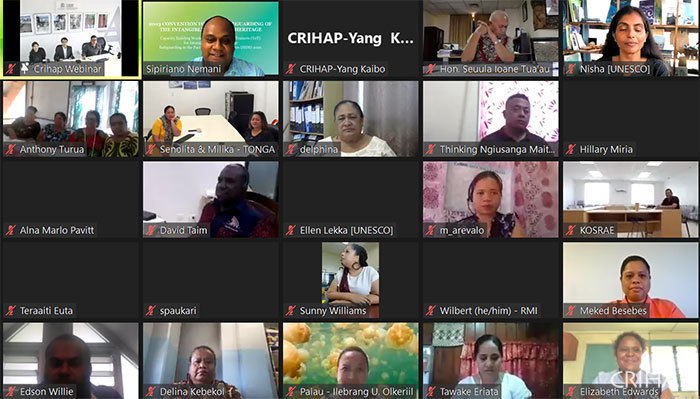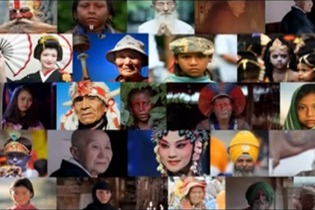Capacity-building Workshop for Training of Trainers on ICH Safeguarding in Pacific SIDS held online
 |
| Participants of the online Capacity Building Workshop for Training of Trainers for the ICH Safeguarding in Small Island Developing States (SIDS) in the Pacific Region pose for a group photo on Oct 18, 2021. |
The International Training Centre for Intangible Cultural Heritage in the Asia-Pacific Region under the auspices of UNESCO (CRIHAP) in partnership with UNESCO Office in Apia, organized a Capacity-building Workshop for the Training of Trainers for ICH safeguarding in Small Island Developing States (SIDS) in the Pacific Region from Oct 18 to Dec 9, 2021
A total of 36 participants, including government and cultural officials and heads of cultural organizations from a total of 13 small island countries in the Pacific region, participated as trainees in this workshop. UNESCO ICH facilitators Mr. Sipiriano Nemani and Ms. Meked Besebes were invited to give lectures.
Nisha, Director and UNESCO representative to the Pacific States, Seuula Ioane Tua’au, Minister for Education, Sports and Culture of Samoa and CRIHAP Director-General Liang Bin attended the virtual opening ceremony and delivered speeches.
Seuula Ioane Tua’au highlighted the importance of intangible cultural heritage in the Pacific. He noted that “safeguarding ICH is aligned with national and local priorities, as well as with the needs of the concerned communities, groups and individuals”.
Nisha noted that “The Intangible Cultural Heritage Convention is the most widely ratified of the UNESCO Conventions in the Pacific. It requires national level capacities for collaborative and effective ways to promote safeguarding of the Intangible Cultural Heritage at the national level. With joint efforts, we hope to increase the number of local ICH facilitators from the current 3 to at least 1 for each Small Island Developing States.”
Liang Bin briefly reviewed the training workshops that CRIHAP has been organizing for the Small Island Developing States in the Pacific region since its inception in 2012. Despite the challenges posed by the COVID-19 pandemic, CRIHAP will continue to provide online workshops and contribute to the region’s ICH safeguarding, Liang added.
The workshop is the first workshop of a three-year ToT training programme for the region. CRIHAP had strong support from UNESCO Headquarters and the UNESCO Office in Apia.
Through a combination of "online + offline" model, the workshop paid close attention to both theory and practice. Major topics tackled during the training sessions included implementation of the Convention at national level, identification and inventorying of ICH safeguarding elements, methods for conceptualizing and executing fieldworks, program application, international cooperation in ICH safeguarding and sustainable development of ICH elements.
Coupled with group discussions and fieldwork, the workshop not only gave trainees an insight into the Convention but also allowed them to go deep into local communities and have their horizons broadened by combining ICH-related theories with local knowledge.
Compared with other countries in the Asia-Pacific, the Small Island Developing States are relatively less developed in ICH safeguarding for various reasons. Since its establishment in 2012, CRIHAP has organized nine capacity-building workshops for ICH safeguarding for SIDS in the Pacific region, playing a positive role in enhancing their ICH safeguarding capacities.
As the very first workshop for the training of trainers for the region, trainees showed great enthusiasm and engaged in dialogue with representatives from UNESCO and CRIHAP ardently. Furthermore, participants offered their suggestions on the training and looked forward to more follow-up workshops in the near future.
CRIHAP would keep paying close attention to the Capacity-building on ToT within this region, and try to make positive efforts in terms of the overall development in the ICH safeguarding work.
To date, the CRIHAP has organized a total of 58 ICH capacity-building workshops, covering 41 countries and regions, with 1,974 direct beneficiaries from the Asia-Pacific region.
(Original Chinese story by Shi Xuan; translated by Zhu Linyong)

Address: 81, Laiguangying West Road, Chaoyang District, Beijing, China
Zip Code: 100021
Tel: 86-10-64966526
Fax: 86-10-64969281
E-mail: crihap@crihap.cn
Leave us your e-mail address, we'll let you know about current events.



